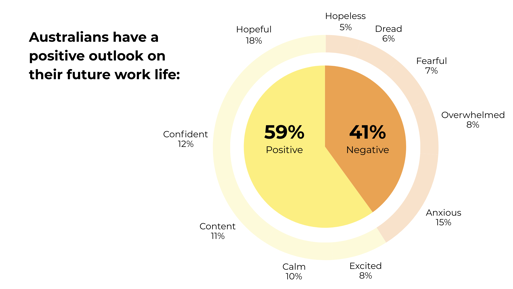What's on this page?
Jump to:
- Reasons You Might Consider a Career Change at 50
- Five Common Reasons for Changing Career at 50
- Five Advantages of a Career Change at 50
- Challenges of a Career Change at 50 (And How to Overcome Them)
- Five Steps to Retraining and Changing Careers at 50
- What NOT to Do When Changing Careers at 50
- A Career Advisor’s Advice: Quick-Fire Top Tips for Changing Careers at 50
- The Five Best-Paid Careers and Roles for Career Changers Aged 50+
- A New Beginning for Your Career at 50: How We Can Help
- Student Success Story: Changing Careers at 50+
- FAQS on Changing Careers at 50
Reasons You Might Consider a Career Change at 50
By the time you reach your 50s, your priorities, and the world around you, may have shifted. Maybe your industry is evolving or shrinking. Maybe you're ready for more flexibility. Or maybe you're just ready to do something that feels more rewarding.
For many people, this is a moment of re-evaluation. You might finally be in a position to pursue a long-held interest, or feel a strong urge to make your remaining working years more meaningful. It’s also a common time to start thinking about how work fits into your life, rather than the other way around.
Others approach career change at 50 with a practical mindset – preparing for a phased retirement, or retraining to stay employable in a changing job market. Whether it's about passion, practicality, or a bit of both, this is a stage where making a change can lead to renewed energy, purpose, and future-proof stability.
Five Common Reasons for Changing Career at 50
Everyone’s story is different, but there are some recurring reasons we hear from people in their 50s who are considering a new direction:
- You’re ready for a new challenge: After decades in a particular industry or role, it’s natural to want something fresh. Something that stretches you, excites you, or simply feels different from what you’ve always done.
- Your job or industry is changing: Technology and automation are transforming many sectors. If your current role is at risk, now might be the right time to reskill and pivot into a more future-proof field.
- You have fewer family commitments: For some, the kids are grown, or their caregiving responsibilities have eased, giving them space to focus on their own goals for the next stage of life.
- You’re financially more stable: Maybe the mortgage is paid off or you have savings behind you; it may finally feel possible to take a calculated risk – to earn less initially or invest in training for something new.
- You’re chasing long-held ambitions: Whether it’s a career you’ve always dreamed of or simply the feeling that it’s now or never, many people in their 50s are ready to make work more meaningful.
Workforces in Australia and New Zealand are becoming significantly older...
The Organisation for Economic Co-operation and Development (OECD) has reported in 2025 that Australia's workforce now has more "older people" (65+) in it than ever before. In a surprising statistic, it forecasts that "The number of old-age people per working-age person will rise by 67% by 2060" and that creating "more jobs for older workers and promoting gender equality at work [will be needed to] stabilise employment-to-population ratios".
Over in New Zealand, The Ministry of Business, Innovation, and Employment (MBIE) has reported that, "the number of people [in the workforce] aged 65+ doubled between 1991 and 2020, reaching 790,000. This is projected to double [again] by 2056."
Why is this worth mentioning? If you're thinking that it's strange or "too late" to progress your career over the age of 50, then the workforce stats say otherwise. People are working for longer, until later into their life, and governments are starting to realise that the only way to make this work is to create jobs for older workers.

Five Advantages of a Career Change at 50
Changing careers at 50 can feel daunting, but it also comes with some serious advantages. In fact, many employers value mid-life career changers for exactly the qualities younger candidates might still be developing. For more information, you can take a look at our guide to the benefits of a making a career change in later life.
- You bring decades of experience: With 30+ years of work behind you, you’ve built up professional instincts, problem-solving ability, and resilience. All of which are useful in any sector.
- You’ve likely held leadership or senior roles: Even if you’re moving into a new field, the experience of managing people, projects, or budgets can give you a big edge, especially in industries like tech or project management.
- You understand how to adapt: If you’ve worked across different sectors or businesses, you’re likely skilled at navigating change and handling ambiguity. Both highly prized traits in fast-moving industries.
- You have a rich base of transferable skills: From communication to critical thinking, many core skills translate easily into areas like IT, cyber, or data; even if your previous job looked very different on paper.
- Flexible, contract-based roles are growing: Many people at this stage are looking for meaningful work without full-time pressure. Contract roles in tech or PM offer a chance to work flexibly while still progressing and earning.
People changing careers at 50+ have valuable work and life experience...
I asked my colleague Jack, an IT Career Consultant, about the advice he gives to career changers aged 50+ when he speaks to them about their career goals:
“Applicants aged 50+ bring with them decades of rich, valuable work experience. Although this might not be directly in the same field as the job applied for, it can still matter. When I talk to older career-changers on the phone, I find myself speaking a lot about the transferable skills they could bring from their previous work into a new career in tech – once they start thinking about it, they always realise that they have tonnes of relevant transferable experience to bring to the table.
I’d also mention that career-changers who are 50+ and might have one eye on retirement, there are many tech and project management roles out there offering contract-based work to those with the right qualifications. This may be a great pre-retirement step for those who want to start working less, or more flexibly, but still want to learn and earn for the coming years.”
Challenges of a Career Change at 50 (And How to Overcome Them)
It’s never too late to change careers, but that doesn’t mean it’s always easy. There are some specific hurdles that come up often for people in their 50s. The good news? Most of them can be overcome with the right plan, mindset, and support.
-
It can feel financially risky: Taking time off to retrain or stepping into a lower-paid starter role can feel scary, especially if you're still supporting family or paying down debts. Many career changers ease the transition by retraining part-time or taking on flexible freelance work during the shift.
-
Confidence can take a hit: After decades in one field, it’s hard to feel like a beginner again. But confidence grows quickly once you start building new skills and seeing progress, especially with the support of structured training and mentoring.
-
Technology gaps feel intimidating: If you’ve never worked in digital environments, starting out can feel overwhelming. But most modern training platforms are built for beginners, and you’ll often find you’re more tech-capable than you thought.
-
Self-doubt creeps in: “Am I too old for this?” is something we hear all the time. The answer is no. And with thousands of successful mid-life learners behind us, we know exactly how to help you take that first step. Don’t forget: many employers welcome experienced hires, particularly in industries where reliability, leadership, and maturity matter.
The Five Steps to Retraining and Changing Careers at 50
Making a career change at 50 might feel like a big step. But with a clear plan, it becomes a lot more manageable. Here’s what we typically advise career changers in their 50s to focus on:
-
Get clear on what you want from this change: Do you want more flexibility? Meaningful work? Better financial security into retirement? Knowing your goals upfront helps you stay focused and make the right calls.
-
Explore the sectors and roles that suit your skills and lifestyle: Tech, cyber security, data and project management all offer strong progression, decent salaries, and flexible routes in. And they’re open to people from all backgrounds.
-
Tap into your network – and expand it: At 50, you’ve likely got a long list of professional contacts. Start having conversations. Join LinkedIn groups, speak to people in the industries you’re interested in, and don’t be afraid to ask questions.
-
Choose training that works for your schedule and goals: Online, part-time, and self-paced courses can help you retrain without giving up your income. Focus on practical, job-ready certifications employers recognise.
-
Refresh your CV, cover letter, and interview skills: Learn how to translate decades of experience into a concise, focused message. Emphasise transferable skills and your readiness to hit the ground running in a new role.
What NOT to Do When Changing Careers at 50
Changing careers later in life can be incredibly rewarding, but it’s easy to fall into a few common traps. Here are three things we regularly advise people in their 50s to avoid:
-
Don’t wait for the "ideal" moment: You don’t need a perfect five-year plan before taking your first step. Start small (research, training, conversations) and let clarity build as you go.
-
Don’t underestimate your value: It’s easy to assume employers only want younger candidates, but that’s not the full picture. Many employers actively value experience, maturity, and stability. You just need to learn how to frame your strengths.
-
Don’t try to go it alone: Career change is tough at any age. But it’s a lot tougher without support. Lean on mentors, connect with others who’ve done it, and speak to a career consultant who can guide your next move.

A Career Advisor’s Advice: Quick-Fire Top Tips for Changing Careers at 50
If you’re changing careers at 50, here are the things we most often tell our students at this stage:
-
Own your story – don’t apologise for it: Employers want to know why you’re changing and what you bring. Make your experience a strength, not a disclaimer.
-
Transferable skills are your superpower: Leadership, communication, organisation. You’ve likely been using these for years. Learn how to map them to the roles you’re aiming for.
-
Get comfortable with being a beginner again: Starting fresh can be humbling, but it’s also energising. Stay open, ask questions, and embrace the learning curve. It won’t last forever.
-
Choose training that fits your life, not the other way around: Look for flexible, career-focused courses that lead to real opportunities. Not just theory or generic qualifications.
-
Don’t go quiet about your goals: Tell people what you’re working towards. You never know who might introduce you to someone hiring, share a useful course, or offer support. Career change is a team sport.
The Five Best-Paid Careers and Roles for Career Changers Aged 50+
A new career in your 50s doesn’t mean starting from scratch, and it definitely doesn’t mean settling for low pay. With the right training, there are plenty of high-paying, future-proof roles that welcome career changers with real-world experience.
Here are five of the best-paid, most accessible options:
-
Project Manager: Ideal for career changers with experience leading teams or managing budgets. With qualifications like AgilePM®, you can move into roles that offer strong salaries, hybrid working, and contract flexibility. Perfect for those planning toward retirement.
-
Cyber Security Analyst: This field has a major talent shortage across the UK and Australia. With the right certification (e.g. CompTIA Security+), you can retrain in under a year and access roles that pay well and are in high demand.
-
IT Support Specialist: A great entry point into tech, especially for those with solid communication and problem-solving skills. IT support roles often offer on-the-job learning, and salaries grow as your experience deepens.
-
Data Analyst: If you’re detail-focused and enjoy spotting trends, data analytics is a practical and rewarding path. Roles are available across all industries, and training in Excel, SQL, or Power BI can get you job-ready quickly.
-
AI Support or Cloud Technology Roles: You don’t need to be a developer to work in AI or cloud computing. Roles like platform support or cloud operations are accessible and well-paid, especially for those who enjoy structure, systems, and learning new tools.
Student Success Story: Changing Careers at 50+
In the 15 years that Learning People has been operating, we've helped just shy of 50,000 students gain new certifications, and thousands of these have landed new roles. This includes many who are aged 50+.
Guilherme, for example, made the switch into a fulfilling career in Project Management later in life. You can hear more about his journey and successful career change in his video below, or have a look at more of our student success stories:
Guilherme Fiad
After relocating from Brazil to the UK, Guilherme completed the PMP® and AgilePM® Foundation with Learning People to validate the project management skills he gained running his own business.
A New Beginning for Your Career at 50: How We Can Help
Changing careers at 50 isn’t just possible – for many people, it’s the beginning of their most fulfilling work yet. You bring experience, resilience, and clarity. All things that employers genuinely value.
With the right guidance, training, and support network, you can step confidently into a new role in IT, Project Management, or Data, without needing a degree or starting from the bottom.
At Learning People, we’ve helped thousands of people retrain later in life through flexible, career-focused learning. Our Career Consultants can talk you through your options and help map out your next step.
If you’re ready to explore a new path, hit the button below to leave your details, and a Career Consultant will get in touch for a free, no-obligation career consultation, usually within one working day.
FAQS on Changing Careers at 50
*This article was originally written by a Learning People Careers Advisor who work in our UK office in Brighton and Hove, Sophi Barnes. In this version, the original has been edited and adapted so it's relevant and helpful for audiences in the ANZ region.
Related Articles
 Preparing for the job market
Preparing for the job marketSoft Skills vs Hard Skills: Striking the Right Balance in Tech
Discover what soft skills are and why they’re vital for success in tech. Learn how communication, adaptability and emotional intelligence can future-proof your career alongside hard, technical skills.
Read More Changing Career
Changing CareerThe Best Career Pivots for Educators: How to Change Careers from Teaching
Teachers and educators will find that their skillsets are in high demand in other sectors. Learn more about how to change careers from teaching and which new roles might be a good fit.
Read More AI
AIHow to Prepare for AI’s Impact on Australia and New Zealand's Job Market and Careers
The "AI is stealing all the jobs" talk is scary. My best advice: don't panic, prepare. In this guide, I've used current statistics to tell a story of how AI is impacting Australia and New Zealand's job market, and how you can future-proof your career for this digital revolution.
Read More AI
AIHow to Learn AI to Future-Proof Your Career
There’s a lot of noise right now about AI taking jobs. And yes, AI is changing the way work is done in almost every sector. But the smartest response isn’t to panic, it’s to adapt. In this guide, I walk you through how to identify what AI skills you need, and crucially, how to develop them.
Read More

